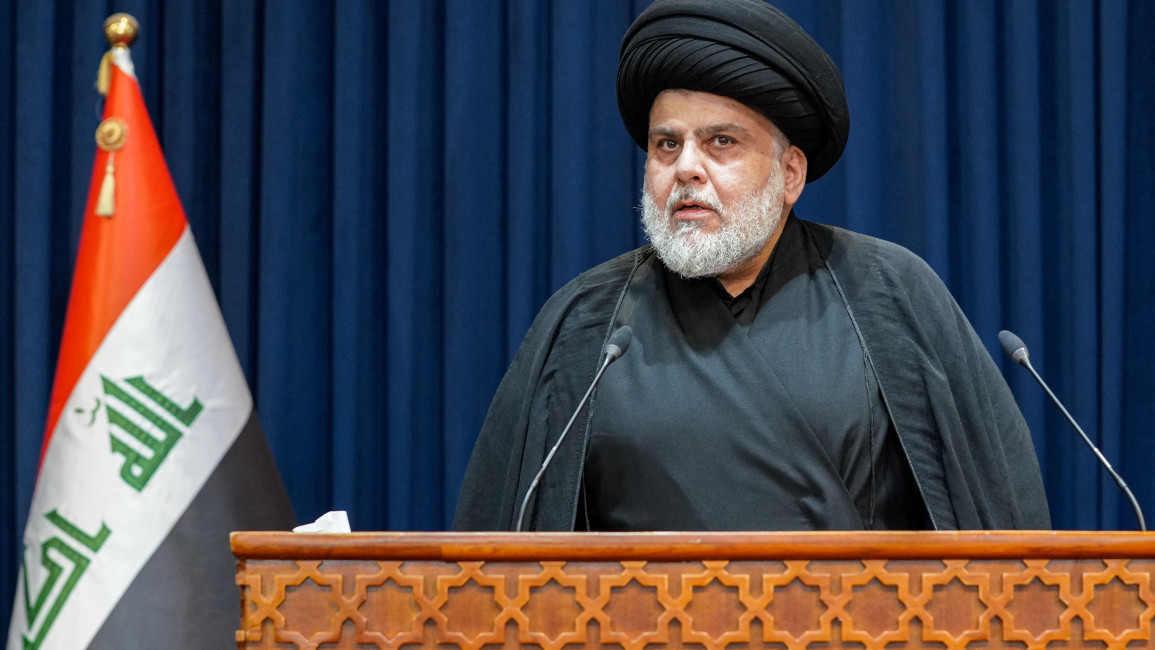Iraqi politicians to seek Shia cleric Sadr’s consent to form a government
Members of a senior delegation of Iraqi politicians are expected to meet with Shia cleric Muqtada al-Sadr next week in the holy city of Najaf, to urge him to help find a solution to the country's political impasse, Iraqi officials told local and international media outlets.
Iraq has been without a new government and president since the October elections after the different Shia, Kurdish, and Sunni political parties could not reach a consensus. Post-election tensions turned the capital city of Baghdad into a battle zone last month, with clashes between pro-Sadr and pro-Iran factions.
"There is a move by Iraqi Kurdistan region President Nechirvan Barzani, Speaker of Iraq's parliament Mohammed Al-Halbousi , the head of the Al-Fateh Alliance Hadi Al-Amiri, head of the Al-Siyada Sunni Alliance Khamis al-Khanjar, for the purpose of holding a meeting between those politicians and Sadr," a senior leader in the Sadrist Movement, who asked not to be named, told Al-Araby Al-Jadeed, The New Arab's Arabic-language sister outlet.
"There are ongoing calls in this regard to make preparations for holding the meeting which is aimed at finding solutions for the political process, as well as convincing Sadr to not let his supporters take to the streets again, since there are concerns that public protests may develop into clashes with Iran-backed groups."
Sadr's Shia rivals, organised under the Coordination Framework, include former paramilitaries of the Iran-backed Al-Hashd Al-Shaabi (Popular Mobilisation Forces) network and the party of former Prime Minister Nouri Al-Maliki, a long-time foe of the cleric.
At least 30 people were killed and more than 180 others injured during intense fighting between Sadr's Saraya Al-Salam militia and Iran-backed militias in Baghdad late last month.
Iraqi National Security Advisor Qasim al-Araji on Thursday expressed his optimism about resolving Iraq's political deadlock.
However, Iraqi political observers say a solution is highly unlikely without Sadr endorsing a candidate for prime minister.
Nearly 190 Iraqi lawmakers from all the Iraqi political blocs reportedly asked Speaker Halbusi to resume the parliament's sessions which were halted in the wake of a Sadrist raid on the building in August.
"Sadr is Iraq's most powerful politician in terms of popularity. In the past, he proved that he can create tensions and end them as well. Accordingly, the Iraqi political sides need to knock on Sadr's door to save Iraq from the political stand-off, even when he is no longer in the parliament or has declared retirement from politics," Othman Gulpi, a Kurdish political analyst told The New Arab in a phone interview.
"Because forming any Iraqi government without Sadr’s consent is doomed to failure and Iraq will always be on the brink of public protests."
Gulpi said that for future talks with Sadr to be successful, pro-Iran political groups must not allow Maliki to lead talks, as the latter will definitely reject it.
He added that in the past two decades, Iraq has been shielded from political deadlocks by closed-door politics and joint agreements between the US and regional and Iraqi allies on one side, and Iran and its proxies on the other.
"Thus, all the Iraqi political sides need a broad agreement to be supported by both Washington and Tehran," Gulpi said.
Sadr was the biggest winner in the October vote but withdrew all his lawmakers - nearly a quarter of parliament - in June and resorted to whipping up street protests after his movement failed to form a government.
The cleric's opponents have tried but failed to form a government in the face of the protests and unrest.


![President Pezeshkian has denounced Israel's attacks on Lebanon [Getty]](/sites/default/files/styles/image_684x385/public/2173482924.jpeg?h=a5f2f23a&itok=q3evVtko)



 Follow the Middle East's top stories in English at The New Arab on Google News
Follow the Middle East's top stories in English at The New Arab on Google News


